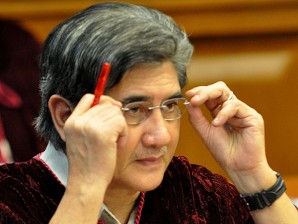Honasan to fight Aquino veto on law dropping height rule for security officers

Sen. Gregorio Honasan. INQUIRER FILE PHOTO
MANILA, Philippines—Saying public safety and public interest are at stake, Senator Gregorio Honasan intends to fight the President’s “ill-advised” veto on the bill to repeal the height requirement for police officers, jail guards, and firefighters.
Honasan said the bill, which he authored in the Senate, would have served important and practical purposes that would benefit the country’s citizens, and should be instituted.
Honasan said the measure was intended to bring more competent people into the Philippine National Police, Bureau of Fire Protection, and Bureau of Jail Management and Penology, who have been kept out because of rules requiring them to be at a certain height. These institutions have long been needing a stronger work force.
Honasan, who is seeking re-election, said he would appeal to colleagues in the Senate and the House of Representatives to fight for the bill that they had passed and overturn the veto upon the resumption of Congress’ sessions. He would need a two-thirds vote of all members for this.
“With all due respect to presidential prerogatives, we feel very strongly that the veto does not serve public interest,” Honasan said in a phone interview.
Article continues after this advertisementHe added that the measure passed through technical working groups and hearings, during which members of the concerned institutions recommended the removal of the height requirement.
Article continues after this advertisementHe explained that his bill was meant to increase the police-to-population ratio from one policeman for every 650 to 700 people, to one policemen for every 500 citizens, he said.
“Public safety and public interest are at stake. Lives are involved here, so we want to increase the police to population ratio,” he said.
Discriminating against people on the basis of height alone was also unjust.
Honasan, a former Army colonel, noted that other countries and major US cities have seen fit to remove the height requirements for police officers, and said the competence of a police officer would not depend on how tall he or she stood.
According to him, it was wrong to peg people’s competence for a job on their height.
“I think we should modernize our way of thinking. When we say modernize, we think in terms of equipment or funding, but we also need to change our way of thinking,” he added.
The abolition of the height requirement would also serve more practical purposes, he said.
For instance, the BFP would need smaller people to go through narrow windows or alleyways so that they could save people or put out fires more quickly. There are also instances when police forces would need men of less height to go through canals or air conditioning ducts as part of intelligence operations.
Under present rules, the minimum height requirement to get into the PNP, BFP, or BJMP is 5 feet 4 inches for men, and 5 feet, 2 inches for women.
As for the waiver of height requirement that the President had taken into account in giving his veto, Honasan noted that this would only apply for indigenous people. The requirement still discriminates against the rest of the Filipinos.
A co-author of the bill in the House, Nueva Ecija Representative Rodolfo Antonino, confirmed that the waiver would only apply to indigenous people, and likewise defended the wisdom of the bill to abolish the height requirement.
But Antonino said he did not think there would be enough time to overrule the President’s veto. The bill could be re-filed, he said.
Antonino said he had supported the bill because there could be short people strong and intelligent enough to perform the functions demanded by the PNP, BJMP, or BFP.
Like Honasan, he cited situations where having less height would come in handy, especially for firefighters.
He said he heard that some people tried to get a certification that they belonged to certain tribes to qualify for a waiver of the height requirement.
E-military officer and Muntinlupa Representative Rodolfo Biazon supported the President’s veto.
Biazon said police officers, for instance, would be required to handle a lot of street demonstrations and rallies where tall, imposing law enforcers would be effective
“It’s physical practicality. What if for example there is trouble in the mall and a six-footer is involved. Would you have a five-foot tall policeman face off with him? Even in boxing, you cannot pit a lightweight against a heavyweight,” he said.
He said having tall, big public officers would also lessen the use of force and guns.